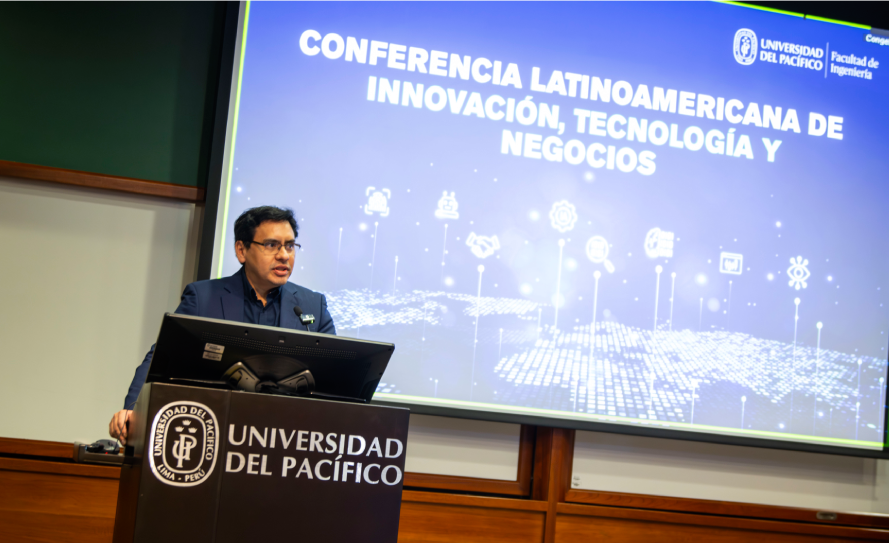The Universidad del Pacífico hosted the Latin American Conference on Innovation, Technology and Business September 3 and 4 in the Aula Magna H-304. Organized by the Faculty of Engineering in collaboration with the Institute of Electrical and Electronics Engineers (IEEE) Peru Section, the event united researchers, entrepreneurs, academics, and students around a common goal: To explore how technological innovation can transform key sectors of society and business in Latin America.
Day 1: Global trends in artificial intelligence
The first day began with the words of Álvaro Talavera, vice dean of the Information Engineering degree program at the UP, and Elva Castañeda, vice president of the IEEE Peru Section's Education Society, who mentioned the importance of building bridges between academia and industry to accelerate digital transformation in the region.

The program combined theoretical exhibitions and practical spaces. Marley Vellasco, the academic vice chancellor of the Pontifícia Universidade Católica do Rio de Janeiro, presented global on trends in computational intelligence, focusing on its application in areas such as robotics and automation. For his part, César Beltrán, senior researcher at the PUCP, explained how generative models applied to satellite images allow for improved environmental monitoring and territorial planning.
.png)
In the afternoon, Leonardo Forero, of the Universidade do Estado do Rio de Janeiro, explored the possibilities of quantum machine learning, while Víctor Hugo Ayma, professor and researcher at the UP, led a workshop on hyperspectral image classification using deep learning techniques. The day closed with the presentation of research by young academics, who addressed topics such as the analysis of social dynamics through unsupervised algorithms, the relationship between artificial intelligence and economics, and new topological proposals for neural networks.
.png)
Day 2: Social and business applications of AI
The second day centered on the social and economic uses of artificial intelligence. Jesús Gómez-Gardeñes, director of the GOTHAM Lab at the Universidad de Zaragoza, opened the day with a conference on the modelling of complex social systems, which took a scientific glimpse at collective processes such as consensus, cooperation, and cultural dissemination.
.png)
Along similar lines, Soledad Espezúa, professor of Engineering at the UP and researcher at CIUP, presented her work on the application of AI to the management of shelters during emergencies such as earthquakes or socio-environmental conflicts, showing how technology can contribute to resilience and decision-making in such critical contexts.
.png)
The business perspective was represented by Juan Lazo, also a professor of Engineering and researcher at the Universidad del Pacífico, who explained how AI models can optimize the management of investments in stocks and cryptocurrencies.
.png)
Thereafter, Leonardo Forero led a workshop on the development of intelligent chatbots, with an emphasis on their educational and corporate applications.
.png)
The day was closed by the presentation by students of their research on urban mobility, complex networks, and social dynamics, cementing the event's importance as a platform to showcase emerging talent.
Innovation with impact
Beyond the presentations and workshops, the conference was notable for its connection of academic knowledge with the needs of the social and business environment. The shared projects and reflections illustrated how artificial intelligence can contribute to both environmental sustainability and financial competitiveness, while also improving quality of life in urban environments.
"At the Faculty of Engineering we seek to create knowledge and spaces that connect academic research with the real challenges of our society. This event reflects our commitment to technological innovation at the service of the sustainable development of the country and the region," said Luciano Stucchi, dean of the Faculty of Engineering at the University of the Pacific.
Commitment to the future
With this event, the Universidad del Pacífico reaffirms its leadership in the promotion of innovation and applied technology. Through its Faculty of Engineering, the UP promotes the training of professionals who can spearhead digital transformation through an ethical vision, social impact, and global reach.
The success of the conference consolidates the university as a regional benchmark in interdisciplinary research and as a platform for dialogue aimed at the construction of technological solutions that respond to the challenges of the 21st century.